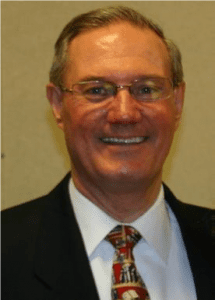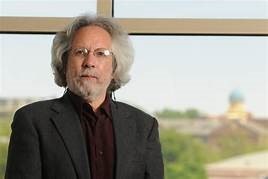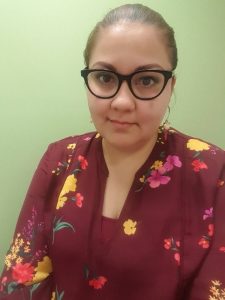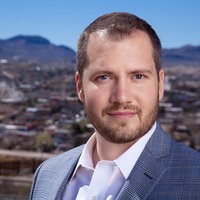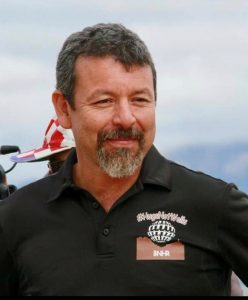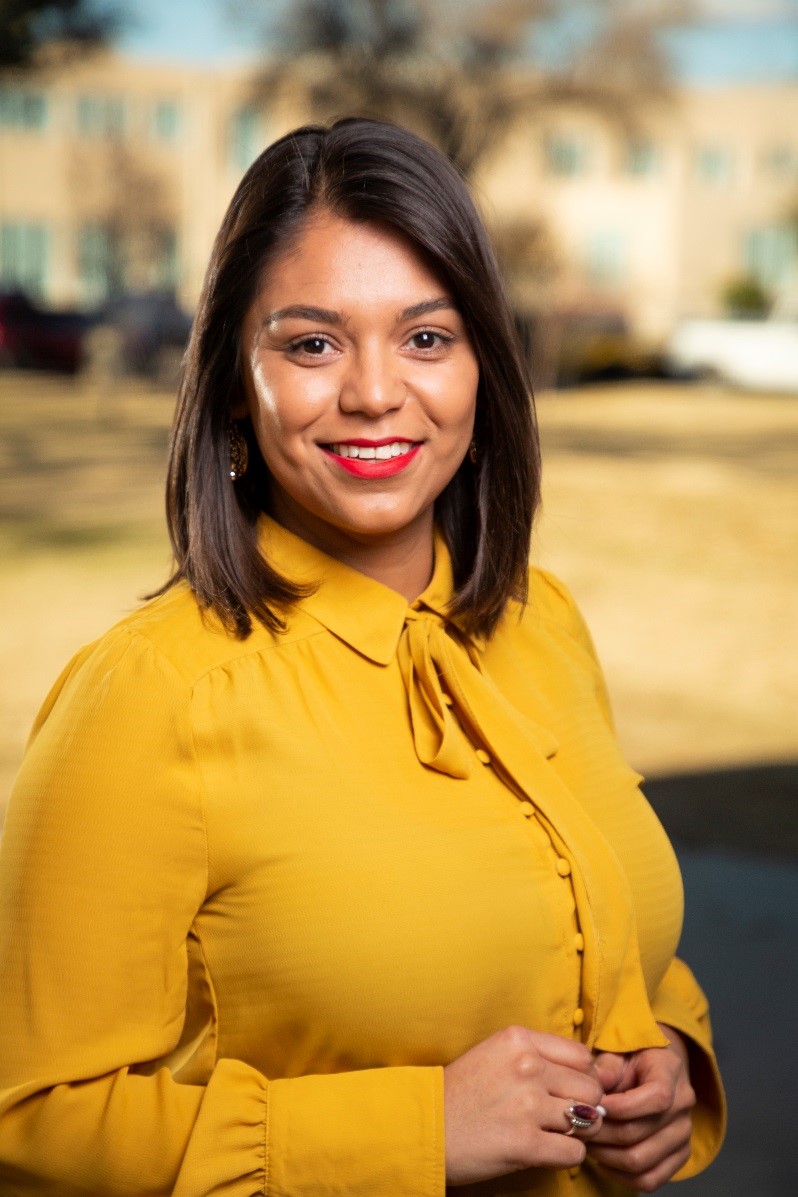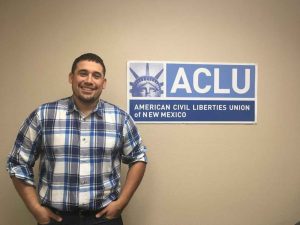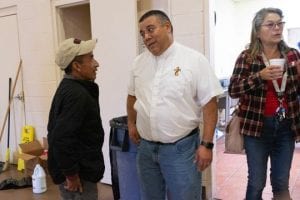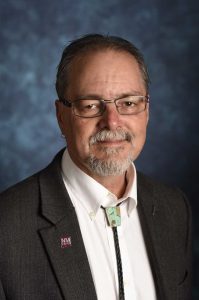Please see the following link for the final version of the program: Final Program.
New Mexico State University
College of Arts & Sciences and the Office of the Vice President for Research
Department of Philosophy and Department of Government
Present the
15 th Annual J. Paul Taylor Social Justice Symposium, 2019
Justice for Migrants
with generous support from the Guadalupe Institute
Thursday, April 11 (3.30-8.00 pm) & Friday, April 12 (9.00 am-11.00 am)
Location: N MSU Las Cruces campus
Gardiner Hall, GN 230
With closing summary discussion (Friday, April 12, 12.00-2.00 pm) at
the Center for Latin American and Border Studies,
Nason House, 1070 University Avenue (directly across from FedEx)
Free and Open to the public
Spanish/English translation available throughout the symposium
For more information, contact:
Patricia Vargas (575) 646-4935 or pvargas@nmsu.edu
15 th Annual J. Paul Taylor Social Justice Symposium
Justice for Migrants
April 11-12, 2019
New Mexico State University, Las Cruces
The goal of this symposium is to reflect on the philosophical values, public narratives and community organizing that go in to the defense and promotion of human rights of immigrants, residents of border communities, DREAMers, asylum seekers and all migrants in Mexico and the US. Panelists will draw on their own areas of expertise and experience to address key questions, including:
What do we understand by human rights in our own areas of work?
What elements does the US Constitution provide in terms of equal protections for all residents of border communities?
What current challenges exist for advancing public narratives that would place human rights at the center of immigration debates?
How are migrants and asylum seekers treated in Mexico?
How have the human rights of migrants been affected by zero tolerance, family separation, restrictions on ability to request asylum and the return of migrants from the US to Mexico?
The symposium brings together university researchers, community-based advocates, reporters and students to share their own philosophical perspectives and experiences regarding the promotion of justice for migrants.
Activities include two panels of invited speakers, a keynote address on the particular human rights challenges in Ciudad Juárez, the presentation of student research posters on the themes of this symposium, literature tables to share local advocacy work and the sale of books authored by symposium speakers.
15 th Annual J. Paul Taylor Social Justice Symposium
Justice for Migrants
April 11-12, 2019
New Mexico State University, Las Cruces
Program of Activities
Thursday. April 11, 3.30-5.30 (at Gardiner Hall, GN 230)
Panel 1: Praxis of Human Rights Advocacy: Migrants, DREAMERS and Asylum Seekers
- David Holtby, Guadalupe Institute, Albuquerque
- Lori Keleher, Department of Philosophy, New Mexico State University
- Camilo Perez Bustillo, Director of Advocacy, Leadership Development and Research, Hope Border Institute, El Paso
- Blanca Adriana Ontiveros, New Mexico Dream Team
- Nancy Oretskin, Southwest Asylum and Migration Institute (SAMI)
- Neil Harvey, Department of Government, New Mexico State University
Thursday, April 11, 6.00-8.00 pm (at Gardiner Hall, GN 230)
Awards Reception and Keynote Presentation
- Welcoming Remarks: Dr. Dan Arvizu, Chancellor of New Mexico State University; Dr. Enrico Pontelli, Dean of the College of Arts & Sciences; Dr. Luis Cifuentes, VP for Research and Dean of Graduate School; Honorable J. Paul Taylor: and, Michael Keleher, President of Guadalupe Institute
- Presentation of the Department of Government Social Justice Award and the J. Paul Taylor Social Justice Community Award
- Keynote speaker: (Introduced by Dr. Neil Harvey)
Rocío Meléndez Domínguez, Attorney, Derechos Humanos Integrales en Acción, A.C., (DHIAC, Ciudad Juárez, Mexico):
Seeking Justice for Deported Migrants and Asylum Seekers in Ciudad Juárez
Friday, April 12, 9.00-11.00 am ( Gardiner Hall, GN 230)
Panel 2: Praxis of Human Rights Advocacy: Perspectives from Border Communities
- Jeremy Slack, Department of Sociology and Anthropology, University of Texas-El Paso
- Debbie Nathan, author, journalist, editor and translator; Writer for The Nation, The Intercept and The Appeal
- Fernando Garcia, Founder and Executive Director, Border Network for Human Rights (BNHR)
- Johana Bencomo, Director of Community Organizing, NM CAFé (Comunidades en Acción y de Fe)
- Jorge Rodriguez, Regional Center for Border Rights, American Civil Liberties Union (ACLU)-New Mexico
- Deacon Leonel Briseño, Project Oak Tree, Roman Catholic Diocese of Las Cruces
Followed by Student Poster Presentations (Gardiner Hall, GN 230)
11.00-12.00 pm: Student Poster Presentation (See call for poster presentations below)
Summary and Closing Discussion (at the Nason House, Center for Latin American and Border Studies, 1070 University Avenue, directly across from FedEx)
12.15 pm – 1.45 pm: Opening comments from Rod McSherry, Associate Provost of International and Border Programs and Dr. Chris Brown, Associate Professor of Geography and Chair of the Executive Committee of the Center for Latin American and Border Studies, NMSU
Summary of main points and roundtable discussion on next steps (food and refreshments provided)
Call for Student Academic Posters
With the kind support of the Guadalupe Institute, the departments of Philosophy and Government are hosting the 15 th Annual J. Paul Taylor Social Justice Symposium, April 11 th and 12 th 2019. We are interested in student poster presentations that relate broadly to this theme. Undergraduate and graduate students currently enrolled in New Mexico institutions of higher education (including, but not limited to NMSU, DACC, UNM, NM Tech, etc.) and institutions of higher education in the El Paso, Texas area (including UTEP, EPCC, etc.) are welcome to submit posters.
Possible topics include, but need not be limited to:
- Evaluations and Proposals of Immigration Policy
- Problems at Home: Understanding Why People Seek Asylum at the Border – The Lives of Those Left Behind
- Drugs and the Border
- The U.S. Constitution, Law and Immigration Policy
- Crime, Criminal Justice, and Immigration
- Human Rights and Immigrant Rights
- Children, Education, and Immigration
- The Separation of Families
- The Border Wall and The Environment
- Economics and the Border: How do Immigrants Impact the Economy?
- Health and the Border
- Housing and the Border
Posters should include abstracts summarizing the work or a paper thesis no longer than 500 words. In addition…
- Posters presenting (social) scientific research results should have the following sections: Background, Hypothesis, Methods, Results, Discussion/Conclusions, Limitations, Future Directions, Key References.
- Posters presenting normative arguments (e.g., arguments about justice) should have a Background, Hypothesis, Argument (of what are you trying to persuade the reader?), Objections, Summary/Conclusion, and References.
Posters should be posted for viewing on the second level of Gardiner Hall near room 230 by 8:00 am and remain on display until 12:00 pm on April 12 th. Students should be in attendance to present their posters from 8:00 – 9:00 am and from 11:00 – noon on April 12 th. All participating students are invited to lunch at the Nason House following the poster presentation.
Interested undergraduate and graduate students should register with Dana Barksdale in the Department of Philosophy ( dbarks@nmsu.edu) no later than April 3rd, 2019, with their Name(s), Topic, and Contact Information.
Participation will be granted to those who register the first forty posters. Only one submission is permitted per person. A single submission may have multiple authors.
$100 dollars will be awarded to the best graduate student poster.
$50 dollars will be awarded to the second-best graduate student poster.
$100 dollars will be awarded to the best undergraduate student poster.
$50 dollars will be awarded to the second-best undergraduate student poster.
Prizes earners will be notified via email by 5:00 pm on April 20 th. 2019.
Invited Speakers
Thursday, April 11, 3.30-5.30 pm (Gardiner Hall, Room 230)
Dr. David V. Holtby, Member of the Board of Directors of the Guadalupe Institute, Albuquerque
Dr. David V. Holtby served as the in-house editor and also fulfilled administrative duties as editor in chief and associate director of the University of New Mexico Press during a nearly thirty-year career in scholarly publishing. He earned his undergraduate degree from the University of Washington, spent four years as a military intelligence analyst, and completed his doctorate at the University of New Mexico in 1978. Upon retiring in 2006, he resumed historical research, but he shifted his emphasis from the social origins of the Spanish Civil War to New Mexico history. Two award-winning books have resulted: Forty-Seventh Star: New Mexico’s Struggle for Statehood (2012) and Lest We Forget: World War I and New Mexico (2018), each of which has material about immigration into the Southwest.
Dr. Lori Keleher, Associate Professor, Department of Philosophy, New Mexico State University
Lori Keleher is an associate professor of Philosophy at New Mexico State University. She has published essays in development ethics, practical ethics, and ancient philosophy. She is the Vice President of the International Development Ethics Association (IDEA) and on the Executive Council and a Fellow of the Human Development Capability Association (HDCA). She is the coeditor of the Routledge Handbook of Development Ethics (with Jay Drydyk, Routledge 2019); and of Agency and Democracy in Development Ethics (with Stacy Kosko, Cambridge University Press 2019).
Camilo Perez-Bustillo, Director of Advocacy, Leadership Development and Research Hope Border Institute
Camilo Perez-Bustillo is Director of Advocacy, Leadership Development and Research at the Hope Border Institute in El Paso, Texas. He has been a visiting professor in the Department of Government and the Department of Criminal Justice at New Mexico State University and teaches classes at NMSU and UTEP in the areas of international law, human rights and migration. He is the co-author, with Karla Hernández Mares, of the book Human Rights, Utopia and Hegemony in Latin America: Poverty, Forced Migration and Resistance in Mexico and Colombia (Studies in Critical Social Sciences), London: Brill Publishers, 2016, and the English translation of The Ethics of Liberation: In the Age of Globalization and Exclusion, by Enrique Dussel (Latin America Otherwise, Duke University Press, 2013). Camilo is a also Research Fellow and professor affiliated with the University of Dayton’s School of Law, a Fellow of the Comparative Research Programme on Poverty (CROP, a project of UNESCO’s International Social Sciences Council based at the University of Bergen in Norway), and coordinator of the permanent secretariat of the International Tribunal of Conscience of Peoples in Movement, based in Mexico City. He was formerly inaugural Executive Director of the Human Rights Center at the University of Dayton, Director of Immigrant and Refugee Rights at the American Friends Service Committee (AFSC), co-founder and Director of National Advocacy of Multicultural Education, Training, and Advocacy (META).
Blanca Adriana Ontiveros, Program Director, New Mexico Dream Team
Blanca Adriana is a first generation Mexican American immigrant. She has dedicated her career to the advancement of the immigrant Latinx community in the United States. Her journey started at a very young age in the international district of Albuquerque working as a health advocate and later on as community organizer. In 2008, she had the opportunity to work for the Obama Campaign as part of an affiliate of the AFL-CIO, Working America. In 2009, she had the opportunity to start the first program in the state of New Mexico to solely focus on promoting the rights and the protection of immigrant youth. The Albuquerque DREAMERS in Action (ADA) was dedicated to advocating for the DREAM-Act and other laws that protect equal access to higher education of all New Mexican students. In 2011, she had the opportunity to work in Congress and serve in New Mexico’s first district and the Office to Monitor and Combat Trafficking in Persons. In 2012, she served as a Bilingual Special Education Teacher at Gadsden High School in Anthony, NM. In 2016, she transitioned to Chicago, IL where she advocated side to side with the southwest side educators for more inclusive and innovative education policies at the local and state level as an Outreach Director with Educators for Excellence.
Currently, Blanca Adriana works as a Program Director, with the New Mexico Dream Team. As a NISN fellow, she hopes to continue developing as the community leader her community needs and keep promoting access to quality education for all students regardless of their immigration or socioeconomic status. Blanca Adriana holds a Bachelor’s in Political Science and Spanish from the University of New Mexico, a k-12 teaching license from the state of New Mexico and a dual Master’s in Public Policy and Public Administration from Northwestern University.
Nancy Orteskin, J.D, Emeritus Professor, New Mexico State University and co-founder of the Southwest Asylum and Migration Institute (SAMI)
Ms. Oretskin has been an attorney for more than 30 years. She joined the faculty of New Mexico State’s College of Business in 1989 as a business law professor. Since then she has advanced through the ranks and became a Professor in 2012. In September 2015, she became the Interim Department Head of Marketing in the College of Business. Ms. Oretskin has taught both undergraduate and graduate classes in law related topics including negotiation, mediation and sports and the law. Ms. Oretskin retired from NMSU July 1, 2019; she is an emeritus professor and continues to work with students and help many with immigration issues. Over the years, she has published articles on mediation, negotiation, immigration and other law topics.
In 2010, Ms. Oretskin began to practice immigration law. Ms. Oretskin co-founded the Southwest Asylum and Migration Institute (“SAMI”) in 2013. SAMI is a 501 (c) (3) organization and is dedicated to representing those in need of immigration representation who are financially challenged and/or otherwise underrepresented. Ms. Oretskin specializes in representing immigrants seeking asylum; between 2013-2019, she has won more than 20 asylum cases. She has represented individuals from Mexico, Honduras, El Salvador, Nicaragua, Venezuela, Somalia, Ghana, Nigeria, Gambia, Ethiopia and Zimbabwe. Ms. Oretskin’s grandparents first arrived in the U.S. through Ellis Island in New York State at the turn of the century. She respects and highly values all the contributions that immigrants make to the U.S. and is dedicated to fight for fair and equal treatment for all immigrants.
Dr. Neil Harvey, Professor and Academic Department Head, Department of Government, New Mexico State University
Dr. Neil Harvey is a professor and head of the Department of Government at New Mexico State University, where he has been a member of the faculty since 1994. His main areas of research include social movements in Chiapas, Mexico, particularly the Zapatistas and the development of autonomous governments run by Indigenous communities. He has published the book, The Chiapas Rebellion: the struggle for land and democracy (Duke University Press, 1998) and co-authored Governing Latin America (with Joe Foweraker and Todd Landman; Polity Press, 2003).
Dr. Harvey is currently a principal investigator of the National Science Foundation (NSF) Research Experience for Undergraduates (REU) Site Program on Immigration Policy and Border Communities ( Award #1659515 ). Together with co-PI, Dr. Jeremy Slack (Sociology & Anthropology, University of Texas-El Paso), he directs a three-year program (2017-20) to train undergraduates students in Community-Based Participatory Research methods and mentor student projects on the nature and impacts of immigration policies in the southern New Mexico-El Paso-Ciudad Juárez borderlands region.
Thursday, April 11, Gardiner Hall, Room 230
6.00-6.30 pm – Symposium Welcome and Presentation of Social Justice Awards
6 .30 pm: Keynote Speaker: Ms. Rocío Meléndez Domínguez, Attorney, Derechos Humanos Integrales en Acción (DHIA), Ciudad Juárez, Chihuahua, Mexico
Rocío Meléndez Domínguez graduated with her degree in Law from the Universidad Autónoma de Ciudad Juárez (UACJ). She studied the Specialization in Migration, Asylum and Refuge from a Human Rights Perspective, taught by the Universidad Nacional de Lanús in Argentina. She has also studied several human rights courses at institutions such as the Latin American Faculty of Social Sciences, Universidad Iberoamericana de Puebla, Universidad de Colima, among others.
She has held positions in local and state Government in Chihuahua, as well as in different human rights organizations in Ciudad Juarez.
She is currently working at DHIA (Derechos Humanos Integrales en Acción), a non-profit organization whose objective is the promotion and defense of the right to equality and non-discrimination. Her main activities are the legal representation of undocumented foreigners in Mexico and the documentation of violations of human and civil rights of Mexican people repatriated from the United States.
Friday, April 12, 9.00-11.00 am (Gardiner Hall, Room 230)
Dr. Jeremy Slack, Assistant Professor, Department of Sociology & Anthropology, University of Texas, El Paso
Dr. Jeremy Slack is an Assistant Professor in the Department of Sociology and Anthropology at the University of Texas, El Paso. He received my PhD from the School of Geography and Development at the University of Arizona in 2015. His research interests include the U.S. Mexico border, undocumented migration, deportation, drug trafficking, violence, Political Geography, State theory and psychoanalytic geography. I have published in Human Organization, Practicing Anthropology, Norteamérica: la revista del UNAM/CISAN, and Social and Legal Studies among others. I was also the 2013 recipient of the Richard Morrill award for Public Scholarship by the Political Geography Specialty Group of the Association of American Geographers. Based on two waves of an innovative survey of the violence and abuse experienced by deported migrants, Dr. Slack co-authored with Daniel Martínez and Scott Whiteford the book, The Shadow of the Wall: violence and migration on the US-Mexico border. University of Arizona Press, 2018. His forthcoming book, Deported to Death: How Drug Violence is Changing Migration on the US-Mexico Border, will be published in July 2019 by the University of California Press. Dr. Slack is co-PI, with Dr. Neil Harvey, for the National Science Foundation (NSF) Research Experience for Undergraduates (REU) Site Program on Immigration Policy and Border Communities ( Award #1659515 ) (2017-2020).
Debbie Nathan, Author, Journalist, Editor and Translator, and Board Member of the National Center for Reason and Justice (NCRJ)
Debbie Nathan was born and raised in Houston, Texas. She has been a journalist, editor and translator for almost three decades. She specializes in writing about immigration, the U.S.-Mexico border, sexual politics and sex panics, particularly in relation to women and children. Debbie is author and co-author of four books, including Sybil, Inc. She has been involved in translating two others into English — one from Spanish and the other from Latin American Yiddish. Her essays appear in several anthologies, and her work has been published in venues as varied as Redbook and The Nation, Ms. and Playboy, The Texas Observer and Social Text, The New York Times, Vibe, The Intercept and The Appeal. Debbie’s work has won numerous national and regional awards, including: The H.L. Mencken Award for Investigative Journalism, PEN West Award for Journalism, several prizes from the Association of Alternative Newsweeklies, the Texas Institute of Letters Award for feature journalism, the Hugh Hefner First Amendment Award for Journalism, and the John Bartlow Martin Award (from Northwestern University’s Medill School of Journalism) for Public Service Journalism. She is a board member of the National Center for Reason and Justice (NCRJ), an “innocence project” for people falsely accused of harming children. Her most recent and current work, which focuses on the impacts of immigration policies on migrants and border communities, appears in The Nation, The Intercept and The Appeal.
Fernando García, Founder & Executive Director, Border Network for Human Rights (BNHR)
Fernando Garcia is the Founding Director of the Border Network for Human Rights (BNHR). The BNHR supports border communities in the promotion of their human rights and the demand of humane of immigration reform that is consistent with human rights. As Director, Fernando is responsible for building community capacity through the creation of Human Rights Committees and the leadership development of Human Rights Promotores. While the base of Border Network includes 800 families (close to 10,000 individuals) and spans from Southern New Mexico to West Texas, BNHR has shared its community-organizing model across Texas and the country. BNHR has trained and provided support to communities in Austin, Dallas, Fort Worth, Houston, Texas Rio Grande Valley, San Jose, CA, New Jersey, and Arizona. Under Fernando’s coordination, the Border Network for Human Rights has also worked closely with local elected officials and community organizations to change how law enforcement agencies interact with border residents. The implications have led to policy changes on how local law enforcement cooperates with immigration officials while building close relationship with enforcement agencies to prevent the abuse of authority.
Johana Bencomo is the Director of Organizing for NM Comunidades en Acción y de Fe (CAFé). Johana is originally from a small Colonia in Chihuahua, Mexico, having migrated to the US with her family when she was 8 years old. Johana has called the Borderlands her home for the last 13 years, having earned a Bachelor of Arts in Government and a Master of Social Work from New Mexico State University. She began organizing with NM CAFé almost 5 years ago, leading powerful organizing work in the national and local immigrant rights movement and organizing out of a desire to transform our communities’ pain into power.
Jorge Rodriguez, American Civil Liberties Union (ACLU) of New Mexico
Jorge Rodriguez is a field organizer with the Regional Center for Border Rights of the ACLU-New Mexico. The Center’s website states that “New Mexico is in the heart of the U.S.-Mexico border region, a culturally and economically vibrant area that more than 15 million Americans call home. Unfortunately, in recent decades the federal government has increasingly militarized the border region, saturating our border communities with tens of thousands of federal agents who have a mandate to operate up to 100 miles from the border. Lacking proper oversight and accountability, these border agents routinely violate the rights of the people living in the border region. The ACLU of New Mexico Regional Center for Border Rights (RCBR), based in Las Cruces, NM, advocates locally, regionally, and nationally to rein in the militarization of our border communities and fights to hold federal agencies accountable.”
Deacon Leonel Briseño, Roman Catholic Diocese of Las Cruces, Director of Project Oak Tree
Deacon Leonel Briseño directs Project Oak Tree of the Diocese of Las Cruces, New Mexico. The Diocese, in response to providing hospitality to refugees, who are being released from custody into the El Paso community in order to transition to family living in the United States works closely with Catholic churches in the area who have agreed to provide basic Christian hospitality to families as they transition to family living in the United States. Hospitality consists of lodging, clothing, meals, travel arrangement assistance, and transportation to bus station/air ports.
Friday, April 12, 12.15-2.00 pm (Center for Latin American and Border Studies, Nason House)
Dr. Christopher Brown, Associate Professor of Geography; Chair of the Executive Committee of the Center for Latin American and Border Studies (CLABS); and, Director of the NMSU Spatial Applications Research Center (SpARC), at NMSU
Since becoming interested in U.S.-Mexico border issues while doing his Ph.D. work in the early 1990s, Chris Brown has been actively involved in studying binational water resource issues on the U.S.-Mexico border. Brown’s specific areas of interest include binational water resource policy and the use of applied GIS tools to examine water quality and supply in twin city regions. Brown has a particular interest in comparative studies of these twin cities; at the root of these studies is the desire to see how the regional geographies involved in each area support various policy initiatives. In the last several years, Brown has also focused on the above issues in a “North American context,” exploring a framework that has been advanced by Robert Pastor dealing with the idea of a “North American community.” In this work, Brown explored a comparative analysis of water resource management frameworks on the U.S.-Canada and U.S.-Mexico borders. Brown has also done research that examines the development of metrics by which the quality of life of US-Mexico border residents can be measured. In this work, he completed the development of a human development index for Doña Ana County, New Mexico and also the Doña Ana County Business Atlas to support economic development in the region.
See here for our call for student papers.


